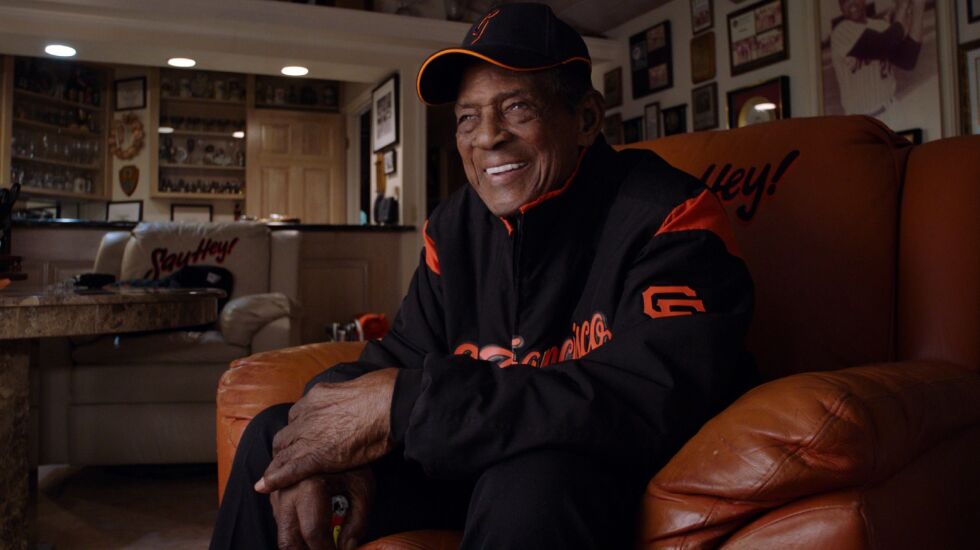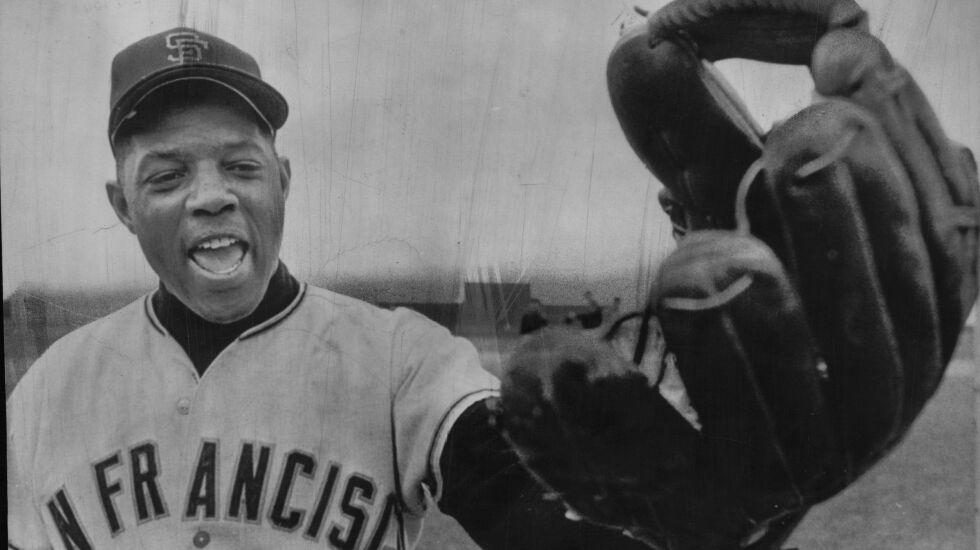
We all love those viral videos that show the likes of the Angels’ Mike Trout and the Dodgers’ Mookie Betts having a catch with fans in the stands before a game, right?
Consider that some 70 years ago, Willie Mays was routinely engaging in next-level interaction with fans. As we see in archival footage presented in the marvelous HBO documentary “Say Hey, Willie Mays!”, when the superstar with the then-New York baseball Giants was living in Harlem in the 1950s, just a couple of blocks from the old Polo Grounds, he would play stickball in the streets with the neighborhood kids for an hour nearly every morning, take them down the street for ice cream like a dapper Pied Piper — and then head for the ballpark. Can you imagine? To this day, there are likely some old-timers still telling the story of how they played stickball in the streets of Harlem with the great Willie Mays when they were young.
If you’re well-versed in the life and times of Willie Mays, this documentary will serve as an invaluable reminder of his greatness; if you’re only vaguely aware of his legend, this is absolute must-see TV. Every baseball fan and every student of American history should know the story of arguably the greatest player ever to don a uniform: a five-tool phenom who was equally spectacular hitting, hitting for power, running the bases, fielding and throwing. (Oh, and let’s not forget the signature “basket catch.” Let the rest of the outfield population — past, present and future — snag flyballs in the traditional manner. Willie Mays dropped his hands down and caught flies like they were canned vegetables toppling from a high shelf. What amazing style!)
The esteemed and prolific author and filmmaker Nelson George is to be commended not only for his seamless storytelling skills, but for snagging an interview with the somewhat reclusive and private, 91-year-old Mays, who speaks of his love of the game and his fond memories of growing up as a baseball prodigy — but refuses to acknowledge he was the best ever. To this day, that’s just not his style. The film leaves it to others, from former teammates such as Juan Marichal and Orlando Cepeda, to broadcasters such as the late Vin Scully and Bob Costas, to sing Willie’s praises.
“Say Hey” takes us through Mays’ childhood growing up in the 1940s Jim Crow South in Fairfield, Alabama, where he was raised primarily by two aunts. Willie’s father worked in the local steel mill, and when his shift would end in the early afternoon, he’d head to the ballpark with his son and teach him the game of baseball. “They called [my father] ‘cat’ because he could run, he could throw and he could field and he could hit, man,” says Willie.
Like father, like son. By the age of 17, Mays was the starting center fielder for the Birmingham Black Barons of the Negro American League. Jackie Robinson, who had recently broken the color barrier in the majors, recommended the Brooklyn Dodgers sign Mays — but their scout reported back that Willie couldn’t hit the curve (whoops) and the New York Giants would up signing Mays and assigning him to their Class B affiliate in Trenton, New Jersey, where he heard vicious slurs from some fans. “They called you all kinds of names, n----- this and n----- that,” recalls Willie, who followed his father’s advice and never acknowledged the hate. “He left that on the field,” says Mays’ son, Michael.
Mays encountered racism throughout his career. In 1958, the Giants moved to San Francisco. As former Mayor Willie Brown recounts, this was a time when if you were Black, “you couldn’t be a policeman, you couldn’t be a fireman, you couldn’t live in certain parts of the city.” When Mays and his then-wife attempted to buy a house on Miraloma Drive, they were initially turned down, purely because of their race.

Still, Mays remained a publicly upbeat, non-controversial presence — guest-starring on TV shows such as “Bewitched,” “The Donna Reed Show” and “What’s My Line?,” never refusing an autograph request and keeping his views to himself as he racked up one sensational season after another on his way to breaking Mel Ott’s all-time National League home run record.
Mays was deeply wounded when Jackie Robinson publicly criticized him for not being a public voice for civil rights and joining the likes of Jim Brown, Muhammad Ali, Bill Russell and Arthur Ashe on the front lines of the fight, but Willie responded by saying, “In my own way, I think I’m helping.” Joe Morgan, Hank Aaron, Frank Robinson and Maury Wills were among the many Black players who spoke up in defense of Mays, citing his behind-the-scenes efforts to help and support them. (Mays’ godson, Barry Bonds, also speaks eloquently and movingly about Mays’ lifelong impact on him. The doc doesn’t get into Bonds’ scandals, nor does it need to; we all know that story.)
Mostly, though, “Say Hey” is a celebration of a player who was so special, so uniquely talented, he would have a place on the Mount Rushmore of the greatest of all time.







